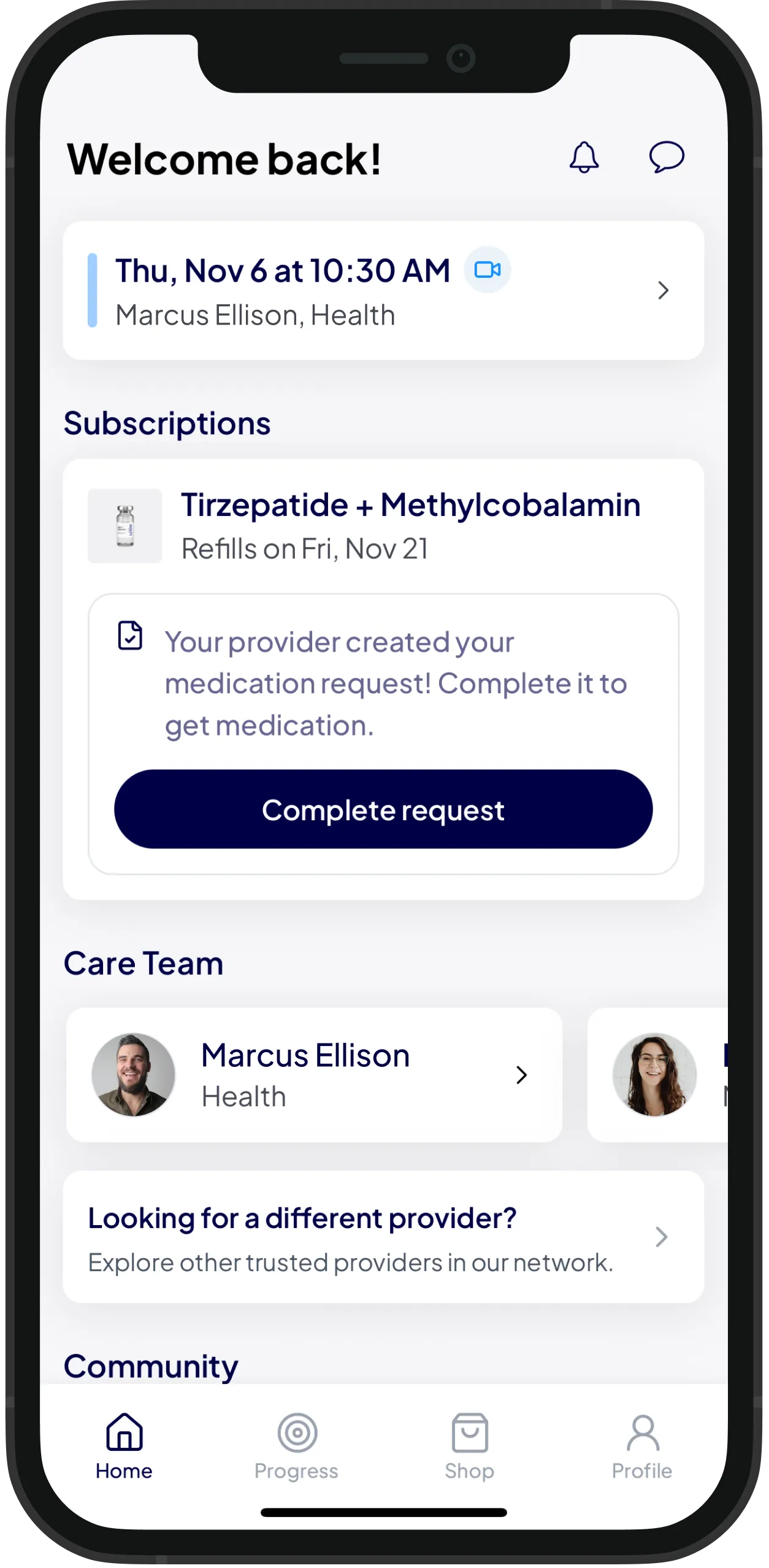Ready to transform your health?
Unlock access to expert guidance and a weight care plan crafted just for you.
Similar Articles
Similar Articles

How to Spot Fake Semaglutide: Safety Risks and Warning Signs
How to Spot Fake Semaglutide: Safety Risks and Warning Signs

Alternatives to BMI: Better Ways to Measure Health
Alternatives to BMI: Better Ways to Measure Health

Is Zofran Safe with Semaglutide? What You Need to Know
Is Zofran Safe with Semaglutide? What You Need to Know
How Fast Do You Lose Weight on Semaglutide? Timelines and Expectations
Learn how quickly semaglutide works for weight loss, what clinical trials show about typical timelines, what affects your pace of progress, and how to maximize results.

Table of Contents
Table of Contents
How Fast Do You Lose Weight on Semaglutide
How Semaglutide Works
Typical Weight Loss Timeline
The First Few Months on Semaglutide
How to Improve Your Results
FAQs
References
How Fast Do You Lose Weight on Semaglutide
How Semaglutide Works
Typical Weight Loss Timeline
The First Few Months on Semaglutide
How to Improve Your Results
FAQs
References
How Fast Do You Lose Weight on Semaglutide
Semaglutide has become one of the most widely discussed medications for weight loss. Many people see dramatic success stories online and want to know how fast semaglutide begins working in real life. While results vary, the medication consistently shows strong, gradual weight reduction over time, especially when combined with supportive habits.
This article explains typical timelines, what clinical trials reveal, what most patients experience week to week, and how to encourage healthier and more sustainable results. If you want to understand whether semaglutide is appropriate for you, you can check your eligibility with Mochi Health at any time: Check your eligibility
How Semaglutide Works
Semaglutide belongs to a class of medications known as GLP 1 receptor agonists. It helps regulate appetite, prolongs fullness, and slows stomach emptying. This leads many people to naturally eat fewer calories without experiencing the intense hunger or cravings that often accompany traditional dieting (Wilding et al., 2021).
Semaglutide doses gradually increase over time. This approach helps minimize side effects such as nausea, and it also explains why weight loss builds progressively rather than all at once.
Typical Weight Loss Timeline
Clinical trials and real world reports show a consistent pattern for most patients:
• Weeks 1 to 4: Appetite starts decreasing, early changes appear
• Weeks 4 to 8: More noticeable shifts in eating behavior
• Weeks 8 to 12: Steady weight loss becomes more visible
• Months 4 to 6: Larger reductions as doses reach therapeutic range
• Months 6 to 12: Continued weight loss followed by a plateau
In the STEP 1 trial, adults on semaglutide 2.4 milligrams lost an average of nearly 15 percent of their starting body weight after 68 weeks (Wilding et al., 2021). Real world analyses show similar patterns when patients remain consistent with treatment and lifestyle support (Wharton et al., 2025).
If you want personalized guidance on dosing, expectations, and long term planning, you can connect with Mochi Health clinicians after completing the eligibility form here: Check your eligibility
The First Few Months on Semaglutide
During the early weeks of treatment, doses remain low as your body adjusts. Most people notice a quieter sense of hunger and a reduced interest in snacking. Weight loss in this period is usually modest. For many patients, the first month is about adaptation rather than dramatic results.
Months Two and Three: Visible Progress Begins
As semaglutide doses increase, people often experience a stronger sense of fullness. Many reach meaningful weight loss milestones between months two and three. At this stage, patients frequently report that eating smaller portions feels natural and not forced.
Months Four to Six: Strong Momentum
By this time, many individuals are at or near their maintenance dose. Weight loss during this period may reach 10 to 15 percent for those who respond well and follow treatment consistently (Wharton et al., 2025). Improvements in blood pressure, cholesterol, and blood sugar also become more common (Rubino et al., 2021).
If you want to explore whether you qualify for GLP 1 therapy with Mochi Health, you can complete the short questionnaire at:
Check your eligibility: https://app.joinmochi.com/eligibility
Why Weight Loss Slows Later On
After a significant amount of weight loss, most people reach a plateau. This is a normal biological response. Metabolism adapts, appetite hormones shift, and the body prefers to maintain stability. Semaglutide can help maintain lower weight, but no medication eliminates plateaus entirely.
What Makes Weight Loss Faster or Slower
Several factors influence how quickly you lose weight on semaglutide:
• Tolerance for dose increases
• Side effect sensitivity
• Nutrition quality and protein intake
• Movement and daily activity
• Sleep and stress
• Starting weight and health conditions
• Medication consistency
Supporting your treatment with regular movement, higher protein intake, and balanced meals helps improve results and preserve muscle, which is important for long term health (Wycherley et al., 2012).
How To Improve Your Results
People often see better progress when they:
• Eat protein at most meals to protect muscle
• Include regular walking or light resistance exercise
• Hydrate consistently
• Avoid skipping meals completely
• Follow their dose schedule closely
• Maintain ongoing communication with their care team
FAQs: How Fast Do You Lose Weight on Semaglutide
How much weight do people lose in the first month
Most people lose a small amount while adjusting to the medication. Larger reductions usually happen after dose increases.
What if I do not lose much weight early on
Some people respond more slowly. Dose adjustments, nutrition patterns, and other factors can influence early results. A slower start does not mean failure.
Does semaglutide stop working at a certain point
Most patients experience a plateau after significant weight loss. This is expected. Semaglutide can still help maintain your healthier weight.
Is semaglutide right for everyone
Not everyone is a candidate. A medical review is needed to determine eligibility. You can begin that process at Mochi Health:
If you are interested in GLP 1 treatment or want to learn whether compounded semaglutide is an option for you, you can start by completing Mochi’s simple eligibility questionnaire. It only takes a few minutes and helps our clinical team understand your goals, medical history, and the safest path forward. Every patient receives personalized guidance, clear information about medication options, and support throughout their care. You can begin your eligibility check today and take the first step toward consistent, accessible, and dependable obesity treatment with Mochi
References
Rubino, D. M., Greenway, F. L., Khalid, U., O’Neil, P. M., Rosenstock, J., Sørrig, R., Wadden, T. A., Garvey, W. T., Davies, M., and Kushner, R. F. (2021). Effect of continued weekly subcutaneous semaglutide vs placebo on weight loss maintenance in adults with overweight or obesity. JAMA, 325, 1414–1425.
Wharton, S., Blevins, T., Connery, L., Rosenstock, J., Raha, S., Liu, R., Ma, X., Mather, K. J., Haupt, A., Robins, D., and König, M. (2025). Daily oral and injectable GLP 1 receptor agonists for adults with obesity. Obesity, 33, 45–57.
Wilding, J. P. H., Batterham, R. L., Calanna, S., Davies, M., Van Gaal, L. F., Lingvay, I., McGowan, B., Rosenstock, J., Tran, M. T., Wadden, T., Wharton, S., and Kushner, R. (2021). Once weekly semaglutide in adults with overweight or obesity. New England Journal of Medicine, 384, 989–1002.
Wycherley, T. P., Moran, L. J., Clifton, P. M., Noakes, M., and Brinkworth, G. D. (2012). Effects of energy restricted high protein diets on body composition. American Journal of Clinical Nutrition, 96, 1281–1298.
How Fast Do You Lose Weight on Semaglutide
Semaglutide has become one of the most widely discussed medications for weight loss. Many people see dramatic success stories online and want to know how fast semaglutide begins working in real life. While results vary, the medication consistently shows strong, gradual weight reduction over time, especially when combined with supportive habits.
This article explains typical timelines, what clinical trials reveal, what most patients experience week to week, and how to encourage healthier and more sustainable results. If you want to understand whether semaglutide is appropriate for you, you can check your eligibility with Mochi Health at any time: Check your eligibility
How Semaglutide Works
Semaglutide belongs to a class of medications known as GLP 1 receptor agonists. It helps regulate appetite, prolongs fullness, and slows stomach emptying. This leads many people to naturally eat fewer calories without experiencing the intense hunger or cravings that often accompany traditional dieting (Wilding et al., 2021).
Semaglutide doses gradually increase over time. This approach helps minimize side effects such as nausea, and it also explains why weight loss builds progressively rather than all at once.
Typical Weight Loss Timeline
Clinical trials and real world reports show a consistent pattern for most patients:
• Weeks 1 to 4: Appetite starts decreasing, early changes appear
• Weeks 4 to 8: More noticeable shifts in eating behavior
• Weeks 8 to 12: Steady weight loss becomes more visible
• Months 4 to 6: Larger reductions as doses reach therapeutic range
• Months 6 to 12: Continued weight loss followed by a plateau
In the STEP 1 trial, adults on semaglutide 2.4 milligrams lost an average of nearly 15 percent of their starting body weight after 68 weeks (Wilding et al., 2021). Real world analyses show similar patterns when patients remain consistent with treatment and lifestyle support (Wharton et al., 2025).
If you want personalized guidance on dosing, expectations, and long term planning, you can connect with Mochi Health clinicians after completing the eligibility form here: Check your eligibility
The First Few Months on Semaglutide
During the early weeks of treatment, doses remain low as your body adjusts. Most people notice a quieter sense of hunger and a reduced interest in snacking. Weight loss in this period is usually modest. For many patients, the first month is about adaptation rather than dramatic results.
Months Two and Three: Visible Progress Begins
As semaglutide doses increase, people often experience a stronger sense of fullness. Many reach meaningful weight loss milestones between months two and three. At this stage, patients frequently report that eating smaller portions feels natural and not forced.
Months Four to Six: Strong Momentum
By this time, many individuals are at or near their maintenance dose. Weight loss during this period may reach 10 to 15 percent for those who respond well and follow treatment consistently (Wharton et al., 2025). Improvements in blood pressure, cholesterol, and blood sugar also become more common (Rubino et al., 2021).
If you want to explore whether you qualify for GLP 1 therapy with Mochi Health, you can complete the short questionnaire at:
Check your eligibility: https://app.joinmochi.com/eligibility
Why Weight Loss Slows Later On
After a significant amount of weight loss, most people reach a plateau. This is a normal biological response. Metabolism adapts, appetite hormones shift, and the body prefers to maintain stability. Semaglutide can help maintain lower weight, but no medication eliminates plateaus entirely.
What Makes Weight Loss Faster or Slower
Several factors influence how quickly you lose weight on semaglutide:
• Tolerance for dose increases
• Side effect sensitivity
• Nutrition quality and protein intake
• Movement and daily activity
• Sleep and stress
• Starting weight and health conditions
• Medication consistency
Supporting your treatment with regular movement, higher protein intake, and balanced meals helps improve results and preserve muscle, which is important for long term health (Wycherley et al., 2012).
How To Improve Your Results
People often see better progress when they:
• Eat protein at most meals to protect muscle
• Include regular walking or light resistance exercise
• Hydrate consistently
• Avoid skipping meals completely
• Follow their dose schedule closely
• Maintain ongoing communication with their care team
FAQs: How Fast Do You Lose Weight on Semaglutide
How much weight do people lose in the first month
Most people lose a small amount while adjusting to the medication. Larger reductions usually happen after dose increases.
What if I do not lose much weight early on
Some people respond more slowly. Dose adjustments, nutrition patterns, and other factors can influence early results. A slower start does not mean failure.
Does semaglutide stop working at a certain point
Most patients experience a plateau after significant weight loss. This is expected. Semaglutide can still help maintain your healthier weight.
Is semaglutide right for everyone
Not everyone is a candidate. A medical review is needed to determine eligibility. You can begin that process at Mochi Health:
If you are interested in GLP 1 treatment or want to learn whether compounded semaglutide is an option for you, you can start by completing Mochi’s simple eligibility questionnaire. It only takes a few minutes and helps our clinical team understand your goals, medical history, and the safest path forward. Every patient receives personalized guidance, clear information about medication options, and support throughout their care. You can begin your eligibility check today and take the first step toward consistent, accessible, and dependable obesity treatment with Mochi
References
Rubino, D. M., Greenway, F. L., Khalid, U., O’Neil, P. M., Rosenstock, J., Sørrig, R., Wadden, T. A., Garvey, W. T., Davies, M., and Kushner, R. F. (2021). Effect of continued weekly subcutaneous semaglutide vs placebo on weight loss maintenance in adults with overweight or obesity. JAMA, 325, 1414–1425.
Wharton, S., Blevins, T., Connery, L., Rosenstock, J., Raha, S., Liu, R., Ma, X., Mather, K. J., Haupt, A., Robins, D., and König, M. (2025). Daily oral and injectable GLP 1 receptor agonists for adults with obesity. Obesity, 33, 45–57.
Wilding, J. P. H., Batterham, R. L., Calanna, S., Davies, M., Van Gaal, L. F., Lingvay, I., McGowan, B., Rosenstock, J., Tran, M. T., Wadden, T., Wharton, S., and Kushner, R. (2021). Once weekly semaglutide in adults with overweight or obesity. New England Journal of Medicine, 384, 989–1002.
Wycherley, T. P., Moran, L. J., Clifton, P. M., Noakes, M., and Brinkworth, G. D. (2012). Effects of energy restricted high protein diets on body composition. American Journal of Clinical Nutrition, 96, 1281–1298.
Read next
Ready to transform your health?
Unlock access to expert guidance and a weight care plan crafted just for you.

Ready to transform your health?
Unlock access to expert guidance and a weight care plan crafted just for you.

Ready to transform your health?
Unlock access to expert guidance and a weight care plan crafted just for you.


© 2026 Mochi Health
All professional medical services are provided by licensed physicians and clinicians affiliated with independently owned and operated professional practices. Mochi Health Corp. provides administrative and technology services to affiliated medical practices it supports, and does not provide any professional medical services itself.


© 2026 Mochi Health
All professional medical services are provided by licensed physicians and clinicians affiliated with independently owned and operated professional practices. Mochi Health Corp. provides administrative and technology services to affiliated medical practices it supports, and does not provide any professional medical services itself.


© 2026 Mochi Health
All professional medical services are provided by licensed physicians and clinicians affiliated with independently owned and operated professional practices. Mochi Health Corp. provides administrative and technology services to affiliated medical practices it supports, and does not provide any professional medical services itself.

















